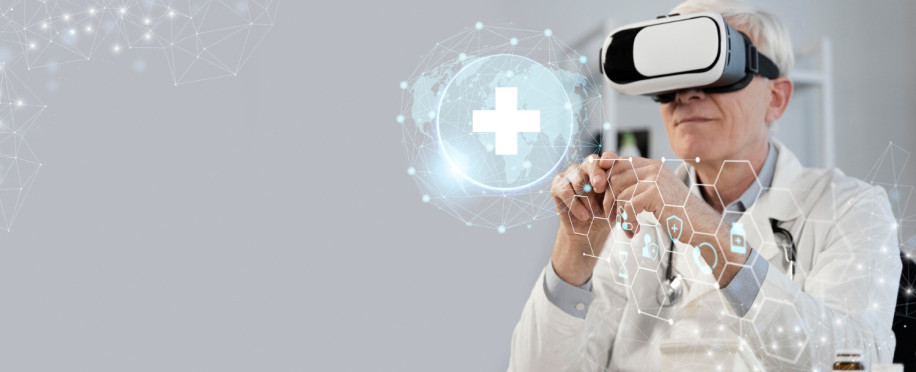Copyright © 2026 lpcentre.com All Rights Reserved. London Premier Centre For Training Ltd Registered in England and Wales, Company Number: 13694538
version: 3.0.1

Posted on : 8/10/2023, 11:52:11 PM
Last Update : 8/10/2023, 11:56:36 PM
The use of healthcare technology today is an urgent necessity in the world of health, especially in medical diagnosis and treatment management. The medical sector has benefited from artificial intelligence technologies in several areas, which has led to competition among major technology companies to introduce more applications usable by healthcare providers.
In this article, we offer the most critical developments by using artificial intelligence and machine learning in healthcare technology.
The healthcare sector is witnessing the use of technology. It has become dependent on artificial intelligence in diagnosis, drug production, and improving the functioning of hospitals and among medical and other departments.
About explains that AI gives the computer the ability to learn through a vast amount of data in all fields and then work on developing an automated system to do the logical processing of research. Saving a lot of time and effort and providing a high-level healthcare pattern.
Here we will mention the most critical areas where used healthcare technology to develop healthcare methods and method, learning well how to use it by joining training courses in healthcare management training courses in Dubai or by tracking the experience of professionals in this field:
Diagnosis of diseases:
Healthcare technology has many features, including artificial intelligence to screen large numbers of patients quickly, early detection and detection of diseases at the earliest stage through the analysis of patients' digital data, and the study of radiological images by artificial intelligence. This process aims to help the doctor reach more effective solutions for patients.
The use of technology in modern medicine is through the preparation of computers that use human intelligence to perform many tasks to detect life-threatening diseases by analysing medical images using deep learning algorithms and then processing data to provide an appropriate diagnosis of the pathological condition, which is an advanced form of machine learning technology.
Treatment Plan:
The contributions of healthcare technology in medicine help determine the appropriate therapy and treatment protocol for each pathological case based on the patient's genetic composition, lifestyle, and different responses to treatment.
Existing studies and experiments in this regard reinforce the integration of the work of the attending physician with AI algorithms using deep learning techniques from embryonic data analysis to large numbers of individuals.
Knowledge of the disparity in drug response provides a clear explanation of the situation and valuable information to support clinical decisions and make recommendations for each person according to their condition.
Use of robots in the medical field:
Human intelligence integration and artificial intelligence are an effective partnership in healthcare technology; its importance is using robots in operating rooms so that the robots can reach out to the surgeon and help doctors plan surgical interventions in detail.
Besides surgical robots, there are mobile robots that provide care alongside the patient's bed and sing many skills in the art of dealing with patients, robotics that expels infection from rooms and sterilise it, robots for laboratory sampling and analysis and preparation of appropriate drug doses, and remote surveillance robots.

In today's world, global companies compete for more sophisticated medical and healthcare robots, contributing to innovative medical services that help medical teamwork and reduce their burden by providing the best benefits and services for healthcare and greater care attention to patients.
Ease hospital work:
Managing files and organising work in private or public hospitals remains one of the problems and challenges facing the health sector in general. The high overcrowding puts increased pressure on the workforce, increasing the likelihood of getting it wrong.
Hospitals must use AI technologies to deliver better results by regulating patients' files by introducing a range of big data into computer systems. Making it easier to access information faster.
This way, the process of extracting data and studying different types of treatment becomes more accessible. The result is to save more lives by using new algorithms designed using artificial intelligence.
In scientific tests and experiments:
Scientists seek to leverage all IT and artificial intelligence features in laboratories, using digital data collected by artificial intelligence technologies such as electronic health records, wearables, etc.
This is an ideal way to save money in this field and ease the work of harnessing science for the service of humanity, to the ease of researching medical reports about people eligible for clinical trials.
The impact of technological science and artificial intelligence on the future of the world and the Middle East must be inferred because it meets the demands of the vast segment of people to improve the quality of health care more than expected.
Besides, medical companies need to know the latest AI software and how to use it. As to keep abreast of new developments in the digital transformation world.
In particular, healthcare technology in health contributes to improved medical services and increased knowledge and is a global strategy to promote profit.
One of the innovative ways of investing that all companies seek to sustain.